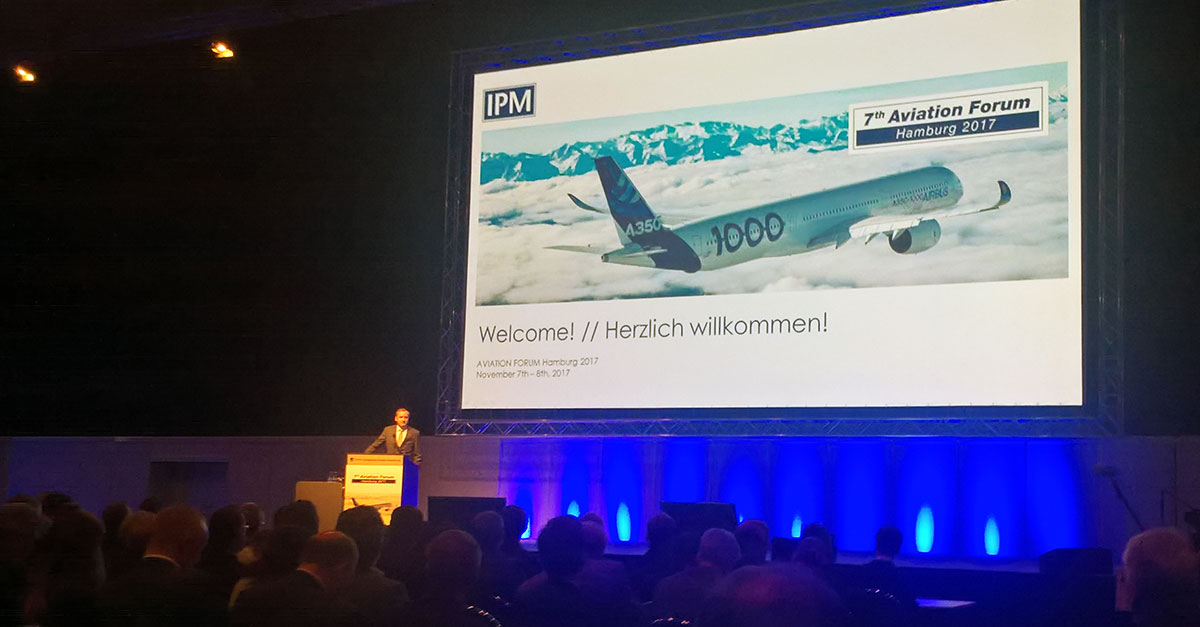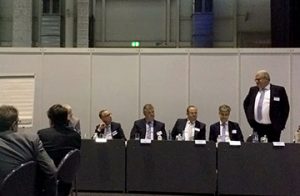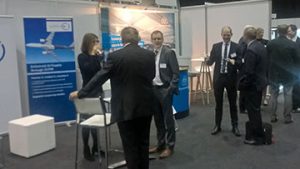Aviation Forum: Advancing the digital value chain in a dynamic world

The location and the timing has changed – but the excellent setup prevailed: this year, the 7th Aviation Forum took off at the beginning of November – this time on the grounds of the Hamburg Trade Fair.
Compared to the previous year, even more exhibitors and visitors attended the leading aerospace event in Germany. The Aviation Forum, organized by the Institute for Production Management (IPM) under the patronage of Klaus Richter, Chief Procurement Officer Airbus, offered an international gathering of speakers and exhibitors from Japan, Russia, Canada, USA, India and Abu Dhabi.The event began on November 7th, 2017 with various plant tours. The options included Kuehne + Nagel, ZAL’s Research and Virtual Reality Centre and the Airbus plant in Finkenwerder.
In his opening speech, Dr. Johannes Walther, CEO of IPM, encouraged all participants to consider the motto of the event as the leitmotif for the upcoming discussions. Namely, potential opportunities and risks of the digital value chain in a dynamic world.
Innovative topics and future technologies shape the agenda
The various facets of this topic then set the tone for the afternoon. These covered a wide range of exciting future-oriented topics – ranging from next-generation aircrafts to additive manufacturing and design, automated production, through to electromobility and autonomous flying.

Of course, the workshop on the future of the supply network was compelling in this context, highlighting the challenges of successful supplier development.
Finally, the panel discussion concentrated on the topic of globalization. Specifically on how the industry will evolve among the world’s major aviation regions over the next decade. The realization: While much potential has been attested to a wide variety of BRIC countries in the last few years, China is now playing in a league of its own.
The day ended on a grand finale note with the traditional gala dinner. As always, it was an excellent opportunity for networking among like-minded people within the aerospace community.
The lectures on day two revolved around automation in aircraft construction, future business models and lightweight construction. A separate Masterclass focused on digitalization as a disruptive driver of innovation and another session dealt with the digital supply chain in the tensions of growing protectionism.
Digitalization is and remains a core issue
In general, digitalization was THE trending topic of the year. Fortunately though, not in the sense of a hype. Rather, the discussions were characterized by a healthy pragmatism and down-to-earth objectivity. Open discussions were held on the advantages and disadvantages, opportunities and risks as well as the right balance. But it also became very clear that if you don’t board the plane now, you will not reach your destination.
In two parallel tracks, the participants then had the difficult task of choosing between two different best-practice presentations, one on ‘global production in a globalized world’ the other on ‘digitalization and innovation’.
Learn to walk before you run…
It quickly became evident that digitalization is a transformation process, which must be carried out step by step. True to the saying: You have to learn to walk before you can run. This also includes involving the Tier n suppliers in the process. A supply chain is only as strong as its weakest link. This is where industry collaboration platforms such as AirSupply can help lay the foundation for the next steps for successful supply chains.
These next steps include the second major topic of the event: decarbonization. This is closely in-line with the increasing electrification of the aerospace industry. For the aerospace industry, this technology offers decisive advantages – both in economic terms (keyword reduced fuel consumption) and in ecological terms, in order to improve their own footprint.
Another major issue was whether to and to what extent OEMs are willing to share proprietary data with their suppliers through secure data repositories.
Supply Chain Performance is a central industry topic
The event came to a close with a definite highlight: The panel discussion on end-to-end supply chain performance. Intensive discussions were held on how to future-proof the supply chain, with digitalization and collaboration as leading topics for in-depth debates. Exciting: The organizers’ response to interactive voting procedures, in which the audience was questioned live via slido.com.

With its new solution for Visibility & Analytics, SupplyOn has hit the nerve of the industry. This cloud-based tool analyzes and evaluates various data sources, greatly increasing transparency in the supply chain.
Conclusion: The Aviation Forum Hamburg provided a comprehensive orientation to the challenges of digitalization in a dynamic world. But above all, it has proven once again that it is not just the leading annual aerospace event for Germany, but goes far beyond that. It has become an annual must-attend event on the industry calendar.




